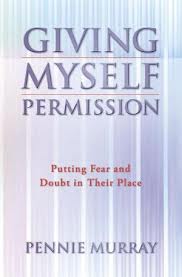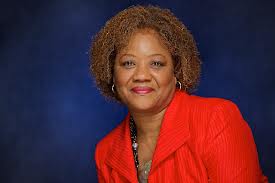Join Pennie Murray, author of the spiritual awareness book, Giving Myself Permission: Putting Fear and Doubt In Their Place, as she tours the blogosphere March 4 – March 29 on her first virtual book tour with Pump Up Your Book!
—————————————————————
 ABOUT GIVING MYSELF PERMISSION
ABOUT GIVING MYSELF PERMISSION
Can something as seemingly insignificant as a childhood playground game demonstrate how unconscious learning can impact your future success and personal dreams? Consider this: Mother, May I? Simon Says…. Red light/Green light. On the surface, these are just silly games. But their message resounds—do not act without permission; if you do, you are out! Oddly enough, many of us are still playing the adult version of these games. We wait for the green light from our parents, siblings, or others before we make a move. We depend on the opinions of significant others to determine the choices we make. In many areas of our lives, we do what “Simon” says at the expense of our authenticity. We play it safe. We avoid. We dumb ourselves down to pacify the egos of others. We act as if we don’t know what to do to change the negativity in our lives when, in fact, we do. Events that seem entirely innocent in fact have the potential to mark us for life. Giving Myself Permission: Putting Fear and Doubt in Their Place is a transformative, self-coaching book that will help to lessen the grip of the emotions that sabotage success, and end the addiction of seeking the approval of others.
Giving yourself permission is a pre-requisite for achieving success in any area of your life. Author Pennie Murray will guide you through a process of self-empowerment that shines a light on what is really preventing you from experiencing the quality of life you desire. Giving Myself Permission will help to reveal the negative conditionings that undermine your efforts towards success. Sifting through the clutter of learned inhibition and detrimental behavior to expose the real culprit behind repeated patterns of self-sabotage, this humorous, yet frank and inspiring book provides practical ways to challenge fundamental assumptions and basic thought processes. It also offers useful exercises that will awaken you to the depth of your personal value, reconnecting you with your potential and your purpose.
Addressing five emotions that frustrate and discourage our efforts towards success, Giving Myself Permission details three transformational shifts that will help you gain clarity and put fear and doubt in their place. Experiencing success in life, love, and purpose starts with giving yourself permission to do so. Read Giving Myself Permission and you will learn that these three words are more than a book title; it’s a higher level of living.
Purchase Link:
AMAZON
—————————————————————
 ABOUT PENNIE MURRAY
ABOUT PENNIE MURRAY
Pennie’s various careers as a police officer, radio talk show host, business owner, and seminar facilitator have shaped her passion for helping others experience their brand of success. She is a speaker, certified NLP coach, author, and the creator of the Giving Myself Permission (GMSP) Movement and Emotional Clarity Workshops™, which help individuals manage the feelings and emotions that frustrate their efforts towards success. With additional certifications in conflict mediation and emotional intelligence, Pennie also coaches individuals to help resolve the internal conflicts that sabotage their efforts towards a greater quality of life. Pennie is the author of the book, Giving Myself Permission: Putting Fear and Doubt in Their Place and the audio CD Asking for Richer Ground: The Power of Your Words.
For more information about Giving Myself Permission: Putting Fear and Doubt in Their Place please visit the website at http://www.givingmyselfpermission.com or contact Pennie Murray at 469-525-1156 or info@penniemurray.com.
Check out her very own self-interview below!
1. Can you please tell us a little about Giving Myself Permission: Putting Fear and Doubt in Their Place?
Giving Myself Permission: Putting Fear and Doubt in Their Place is a transformative, self-coaching book that will help to lessen the grip of the emotions that discourage, frustrate and sabotage success, and end the addiction of seeking the approval of others.
Achieving success in any area of our lives requires the pre-requisite of Giving yourself permission. Addressing five emotions that frustrate and discourage our efforts towards success, Giving Myself Permission details three transformational shifts that will help the reader gain clarity and put fear and doubt in their place. I guide the reader through a process of self-empowerment that shines a light on what is really preventing them from experiencing the quality of life they truly desire. I reveal the negative conditionings that undermine a person’s efforts towards success. In my sometimes humorous, yet always frank and inspiring style, I sift through the clutter of learned inhibition and detrimental behavior to expose the real culprit behind repeated patterns of self-sabotage; as well as provide practical ways to challenge our learned inhibitions and basic thought processes. It also offers useful exercises that will rebuild the trust in their internal resources.
2. What was the hardest part of writing your book?
The hardest part of writing this book was first to actually commit to writing it – again. I say “again” because the philosophy of “giving myself permission” started in 2001 and my first attempt at writing about it resulted in a 97-page book, which failed miserably. So I wasn’t interested in repeating that experience. The second hardest thing was in being transparent about my own struggle with fear and self-doubt, which mirrored many of the other people I met (continue to meet) as a corporate trainer and NLP coach. It would have been easy to write from a place of “others have this challenge.” But I have always been passionate about helping others reach their greatest potential, and it would not have helped anyone for me to pretend that I didn’t struggle with this as well. It’s been said, “Help someone and you help yourself.” While it was hard revealing my own missteps and failings – I grew and continue to grow in the process.
3. Do you have a favorite excerpt from the book? If so, could you please share it with us?
What a hard question! I am passionate about the entire book and it’s message. I suppose this question is to force me to choose; and if I were to choose my favorite I would have to say it would be in the first Chapter in a section called The Awakening (see attached).
4. What do you hope readers will take away after reading the book?
There are four very important things I want each reader to get; (1) I want them to connect with the content, and realize that self-permission is a pre-requisite for them to experience success – without it, sabotaging feelings of fear and self-doubt will continue to control their lives. (2) An African proverb says, “When you understand the ‘what’ and ‘why’ of life, you can endure any ‘how’.” I want the readers to know how important this proverb is to changing the course of their lives (3) I want them to be able to truly lessen the grip of the emotions that sabotage their successes, as well as ending the addiction of seeking the approval of others. (4) I want them to know that because I have also struggled with this issue, and I know how sensitive the subject can be, so I thoughtfully steers them towards regaining trust in their internal resources to improve the quality of their lives, instead of relying on external resources.
5. What was your writing process while writing this book?
I can’t say I had any real process I followed while writing this book. However, I can say because learning to give myself permission was very real for me, I refused to force myself to write. I wrote when my spirit was drawn to write, and stopped when I felt I was struggling to continue.
6. Who or what was the inspiration for the book?
What inspired me to finally commit to writing this book was constantly interacting with people, especially when I starting coaching people on dealing with their emotional hindrances towards success, who were living beneath their potential. They would literally have well-fashioned excuses and justification for staying loyal to their life of mediocrity. When exploring what was really causing this, the responses were always the same – self-doubt and learned inhibitions. It was just a replay of my own journey, and I just couldn’t stand it anymore.
7. Have you had a mentor? If so, can you talk about them a little?
No, I don’t have a mentor
8. I have heard it said in order to be a good writer, you have to be a reader as well? Do you find this to be true? And if you are a reader, do you have a favorite genre and/or author?
From my perspective, this is true. For the last 13 years, my primary genre of writing has been research on human motivation and achievement. When I’m not reading research journals and articles, I love self-help and self-help in the form of allegories.
Spread the love
1 Comment
-
Unless a cheater is heartless with no conscience, morals, or
just a tinge of decency, he will feel a bit of guilt or remorse.


